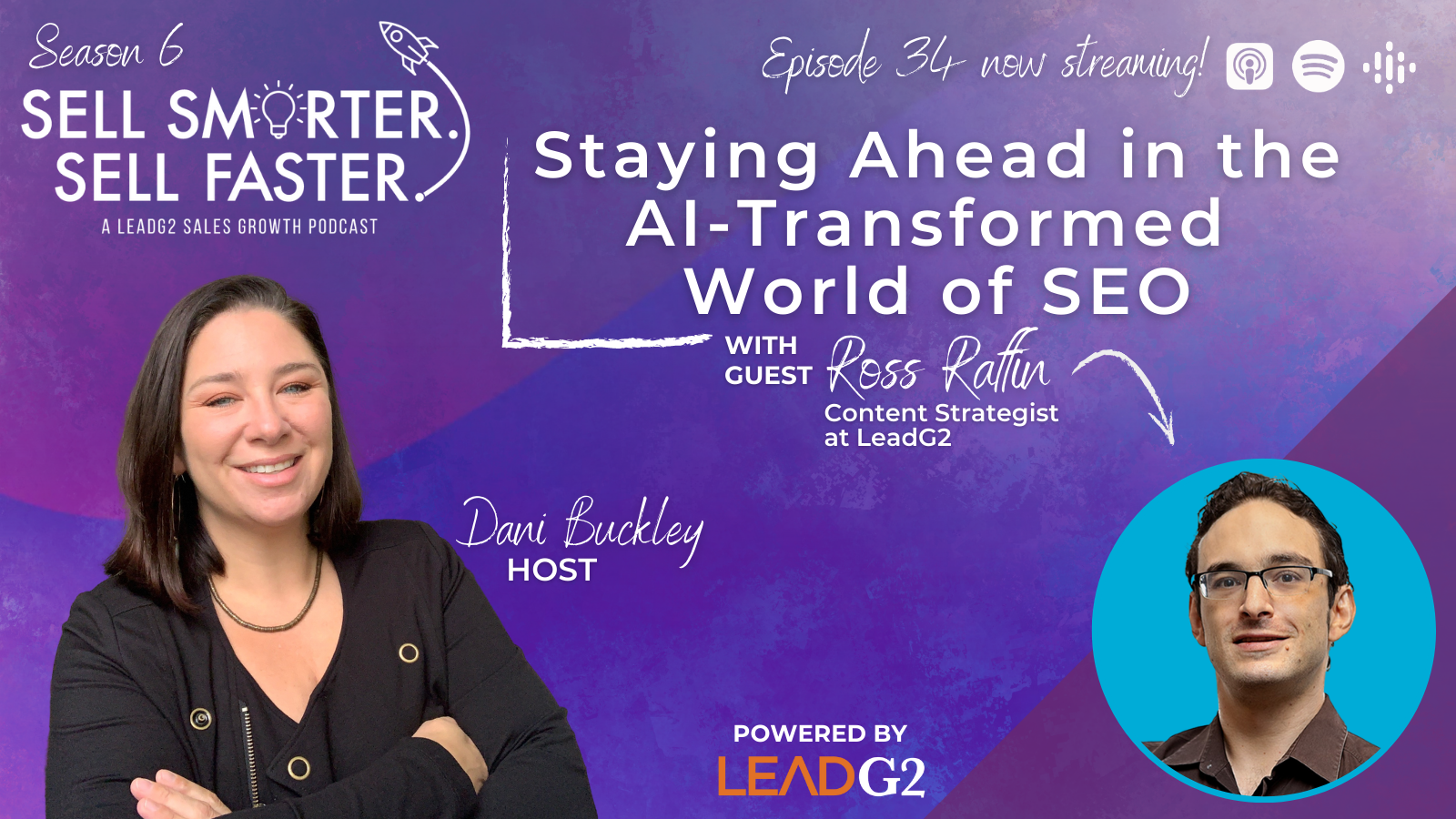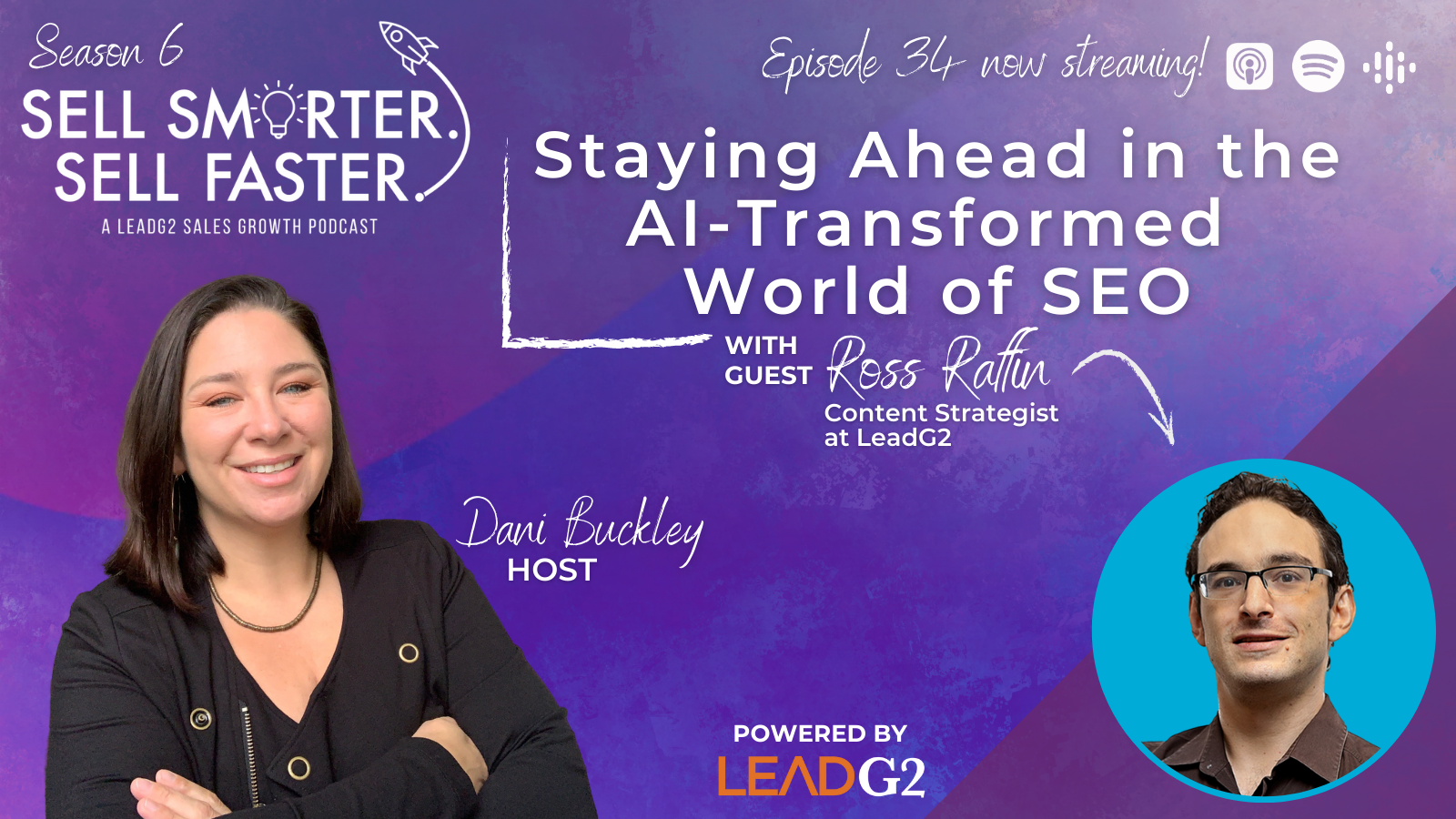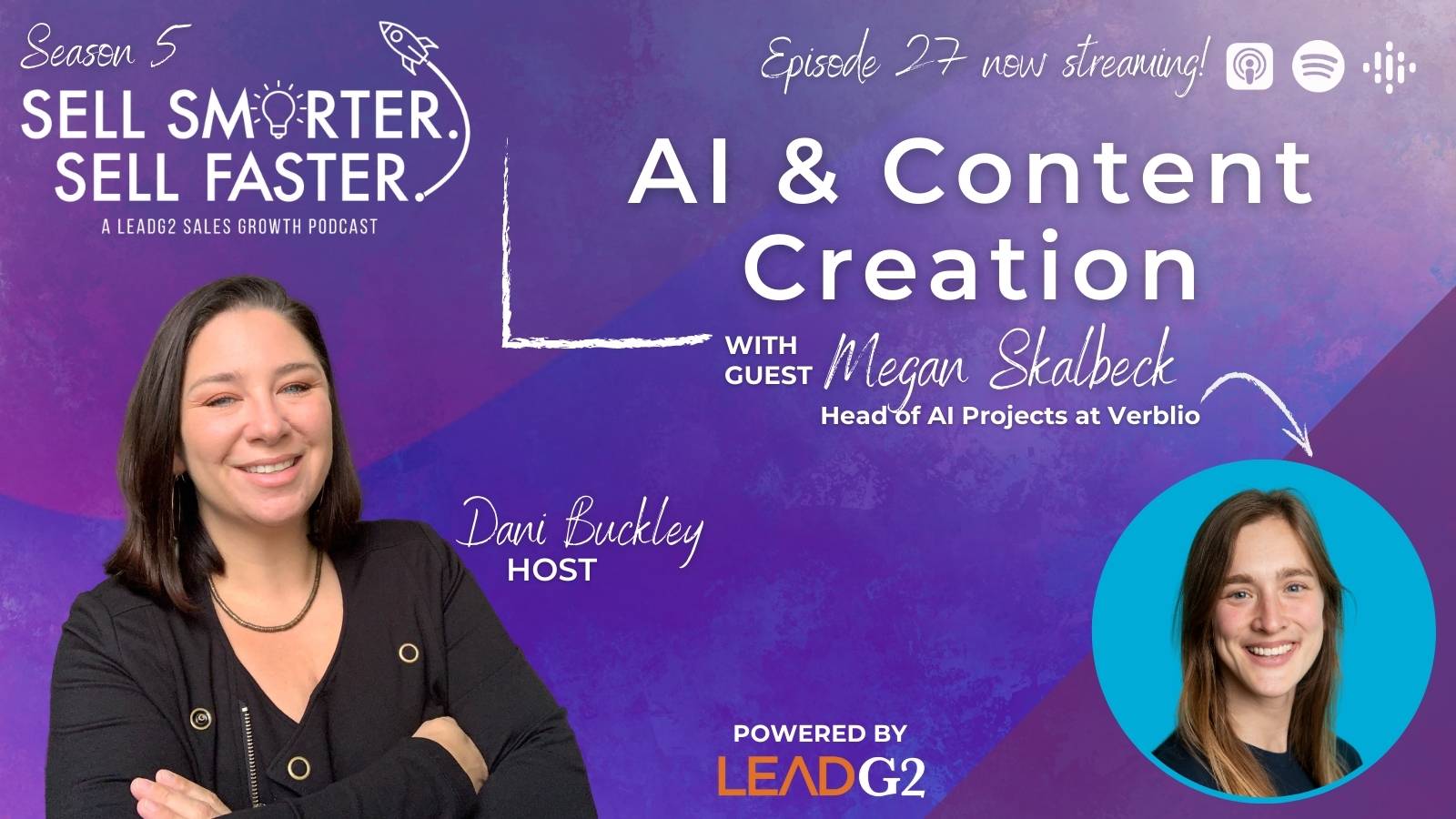The Impact of AI On SEO With Tom Winter
In this episode, we’re discussing AI’s impacts on the world of SEO and what further changes can be expected down the road. We ask questions like:...
9 min read
 Brent Tripp
:
July 5, 2023
Brent Tripp
:
July 5, 2023


In this episode, we’re once again diving into the ripple effects we’re all feeling from the current AI boom. This time though, we’re honing in on its effects on SEO.
How is AI impacting traditional SEO practices? What AI tools are already altering the way that SEO is done? What do those in SEO need to be thinking as new AI innovations continue to be unveiled?
Helping explore this topic is Ross Raffin, content strategist here at LeadG2. Ross has so many great insights, such as:
Why keeping a watchful eye on how Google is folding AI into how their generating search results is important.
The role humans need to continue to play in AI content creation so that you don't negatively impact your SEO results.
And, lastly, the importance of looking beyond ChatGPT and BARD to get a true handle on how AI can empower us and reshape how we work and create.

“So, I just want to get everyone on the same page,” Dani says. “And this is really simplifying it, but when we're talking about SEO, what exactly are we talking about? Put it in the simplest of terms for everybody.”
“SEO stands for Search Engine Optimization,” Ross says. “And really what it's all about is increasing how much exposure your business gets to prospects when they use a search engine like Google.
“When people search the Internet, they have an intent. They may want to buy something, learn something, go somewhere, etc. When SEO is done right, your business will offer the best answer to their search intent.
“So, when they go to your site, you can pull them in using lead generation or e-commerce tactics, depending on the nature of your business.”
“Perfect,” Dani says. “That makes sense to me.
“We can't talk about SEO without AI right now. And we can't really talk about marketing and sales without talking about AI at this moment in time. But let's just start with SEO in general, which is always evolving. There are always new things to be looking at.
“Google likes to keep us on our toes. At this moment in time, we're recording this in May of 2023. What are the SEO trends that you're seeing right now that you think folks should be aware of?
Ross says, “So, the big one, which has actually been rising in popularity because, in a way, it takes advantage of AI and these large language models, is something called semantic SEO.
“Semantic SEO isn't just about answering a single question about a subject. It's about becoming a knowledge base such that Google and the AI programs will use you as their resource for informing people, and this builds what's called topical authority.”
“Also, there’s just a general movement towards automation of smaller tasks, for instance, the creation of meta descriptions.
“Those are the little descriptions you see under the title on a search engine result page. You generally want to have those, and it can be a bit of a slog to just create these little captions blog after blog.
“Using automation, you can basically push out meta descriptions and article titles automatically.”
Dani says, “One thing I know we run into a lot with clients or just folks I talk to is that they're acting on and holding on to things that they knew to be true about SEO a couple of years ago, five years ago, 10 years ago.
“I'm curious what are some of the big misconceptions, or just old best practices that people need to just stop or forget about?”
“There are really two big ones,” Ross says. “The first is that Google no longer looks for strings of letters that match your query. The idea is that, instead of trying to optimize for strings, you optimize for things called entities.
“An entity is just basically a concept, a noun, a person, place, or thing. But when you optimize for entities, as opposed to repeating the same string, you'll actually capture Google's attention much more, because it doesn't really think in the simple terms of, ‘Oh, I see the word red apple appear 10 times. Therefore, this page should rank for red apple.’
“And a common example given is if you wanted to rank for ‘Abraham Lincoln,’ you'd probably want to have words like ‘president’ and ‘White House’ in the article, things that are related to it.
“But if you just had Abraham Lincoln 10 times, then Google really wouldn't know what to do with it.”
“Got it,” Danis says. “I mean, this really just speaks to the old keyword stuffing that people got away with years ago but just doesn't work anymore.”
“And then the other, I'd say, is more about the understanding of the results of SEO,” Ross says. “Too much focus sometimes will go towards keywords, which might be seen as the most important KPI in SEO. Keywords are important. Ultimately, though, it's a vanity metric.
“What counts is ROI. You know how effective your SEO efforts are when it comes to actually getting a return on your investments.
“So, I'd say the big thing is it's good to keep track of keywords. They give you some indicators, but always have an eye on ROI at the end of the day.”
“What are some types of ROI that people should look to when it comes to SEO?” Dani asks.
“Well, for instance, you could take a look at when someone comes in from search,” Ross says. “It's called organic. Let's say, you’re a lead generation company. Look at how many people have filled out a form that also came in from an organic search.
“If you have enough information, you should know the cost per lead. Then you can make a calculation. How much have you paid the SEOs versus how many leads times the cost per lead?”
“Yeah, love it,” Dani says. “I mean, it's not always that easy to calculate cost per lead, which is great if you can, but I just love the idea of looking at not just, ‘Are you getting traffic at the page,’ but is it actually doing what you want it to do?
“If that's a page where you want people to convert into a contact or a lead, great! Are you tracking that? Great reminder.
“Let's talk about AI,” Dani says. “I know that you've been studying this a lot lately. You're on our task force here at our company studying AI and its impact and how we can effectively use it or not.
“How do you think AI technology impacts the traditional SEO practices that we have today? What are you seeing?”
“Well, actually, this is good timing,” Ross says. “As of a week ago, Google unveiled how they will be incorporating AI into Google searches. It's called a ‘search generative experience.’
This will have a very big impact on traditional SEO because, back in the day, it was all about ranking for those 10 blue links. Then things changed a little, and it became about ranking for featured snippets. Now it will be about providing information that Google likes enough to provide in the search generative experience.
“That's very different from trying to rank for a Google page, the traditional way that SEOs do.”
“Yeah, that is a big deal,” Dani says. “Let's talk about AI tools too. Do you have any examples of tools or other AI solutions that you've already seen changing the way SEO is done? I mean, you just mentioned a little bit of that, but anything else that's important from a technology standpoint we should be thinking about or looking at?
“Yeah, I think it's very important to have perspective on this,” Ross says. AI writing assistants have actually been around for quite a few years. There are some relatively big businesses that use it.
“What's changed is the quality of output that AI’s can give. Of course, the big one would be ChatGPT, but when you talk about AI writers, most of them are actually using the same underlying technology as ChatGPT.
“Really, what this is all about is a technology called GPT: Generative Pre-Trained Transformers. That's a lot to remember, but the key thing about it is all of these technologies are about predicting what comes next in a sentence.
“Actually, some people like to refer to it as spicy autocomplete.”
“I haven't heard that,” Dani says. “That’s great.”
“Okay,” Dani says. “Do you have any tips for folks who want to use ChatGPT or something like that for copywriting? Do you have tips on what people should or shouldn't be considered in relation to SEO but also in relation to good content?”
Ross says, “First off, it's important to know that the prompts you create, prompt engineering, is iterative. That means that you're going to create a prompt, it might spit out something useful, then you change the prompt a little, and it gets a little better.
“So, basically, don't expect the first prompt you make to lead to very quality outputs.
“The second thing, one of the big problems with AI writers, is continuity and transitions. With ChatGPT, if you want to make sure that it has transitions between sections, a useful thing to do is first to have it generate an outline (or create your own outline and then put it into chat GPT).
“Then give [that outline] some label, saying something like, ‘refer to this as outline A.’ Then you want to make sure it doesn't execute something, so you'd say, ‘refer to this as outline A. If you understand what I just said, return the word pizza,’ and then it will say, ‘pizza.’
“Then your next prompt is going to be whatever you've created. Basically, it'll be your writing prompt, but you will only write the first section. Somewhere within that prompt, you'll say that there should be transitions between the sections.
“So, what'll happen is you get a series of sections that all have transition statements, and it appears a lot more organic than a lot of these outputs where it just looks like the headers were basically pieced together.”
“Yeah, that's a great tip,” Dani says. “I think that actually comes down to what we've talked a lot about here at LeadG2, which is, just for people out there listening to remember, that AI writers using chat tools like that to create blog posts, create content, etc. is not the end all, be all.
“You can’t just take what it puts out and then publish it. It's really important that you have a skilled, talented editor or whoever it is on the other end that knows how to utilize prompts and also knows how to edit, proof, finalize the piece, and fact check.
“I mean, there's a lot that has to happen. I know that's one of the things that we're seeing, and just really wanted to remind people.
“Yeah,” Ross says. “AI writing can get you to the middle of the pack, but if you want that really excellent stuff, you're going to need a human in the loop.”
“Let's talk about some of the challenges that SEO professionals might be facing as a result of AI innovation,” Dani says.
“And then, I know you touched on Google, but is there anything else to add that’s related to that? Because I know that people are wondering whether Google will be penalizing or not penalizing content written by AI. What are things that people need to be thinking about?
“There are two things,” Ross says. “I think that, right now, a big challenge for SEO’s is less technical and more perceptual.
“We're at a point in the hype cycle with AI where there are companies which are freezing hiring, saying, ‘We're going to transition everyone to AI,’ or saying that ‘We should transition all writers to AI.’
“There is a tendency, perhaps, to challenge the idea, asking, ‘Do I need an SEO? Could I automate it?’
“The problem with that approach is that they'll soon find that a GPT really isn't able to do any of the SEO. The real SEO that you need to move the needle can't be done by an AI.
“And then when it comes to Google, and this is a very important distinction to make, Google is fine with artificial intelligence-generated content.
“What they don't like is low-quality content. So, whether an AI or a human writes low-quality content, Google won't really care for it.
“If it's high-quality, Google does not care if it was written by an AI.
“But again, if you really want a high-quality article, it will take a human in the loop with the AI.”
Dani says, “Yes, that is the big takeaway.”
“Let's transition and talk about keywords and keyword research. How is AI impacting that?” Dani says. “How do you think it can help or not help?”
“This has led to a huge debate in the SEO industry as to whether ChatGPT is going to take keywords away,” Ross says. “The reason they say that is...these days you don't have to go to Google if you have a question that's informational.
“If you just want to know how far Australia is from the United States, you can just ask ChatGPT. What that means is the search volume for informational keywords is going to start to drop over time, especially if it's something that's commonly asked to ChatGPT.
“Now, on the flip side of that, ChatGPT Plus, the subscription version, offers plugins that assist with finding keywords. But again, mostly, these keywords are what are called commercials. So, they’re used for trying to buy something.
“We don't have to worry about a loss of search volume for commercial keywords, but for informative keywords, we're going to see a very large drop.”
“Got it. Great,” Dani says. “Are there any closing tips, best practices? Is there anything related to SEO or AI that we haven’t touched on yet to leave our listeners with?”
“I would like to make one last point related to AI,” Ross says. “Which is where you should keep your attention.
“Google recently had a leaked document which argued that, while Google's Bard and ChatGTP have a small quality advantage right now, they're going to be overtaken by what's called open-source AI projects.
“That means AI projects where anyone can look at the code behind it. Anyone can make an addition to it.
“So, when it comes to which AI source will offer you the most possibilities, within the next year or two years, ChatGPT may be seen as the simplistic version.”

In this episode, we’re discussing AI’s impacts on the world of SEO and what further changes can be expected down the road. We ask questions like:...

In this episode of the Sell Smarter. Sell Faster. podcast, we’re exploring the ever-changing role of artificial intelligence (AI) in content...